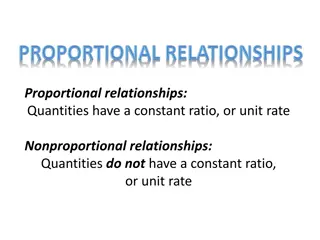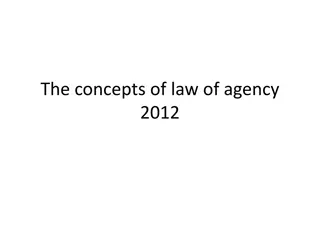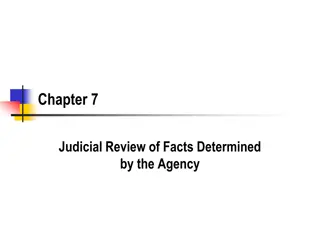Understanding Agency Relationships in Business
Agency relationships in business involve principals appointing agents to act on their behalf. There are different types of agents, such as general agents, special agents, factors, brokers, del credere agents, confirming houses, and commercial agents. Each type of agent has specific roles and responsibilities in conducting business transactions.
Download Presentation

Please find below an Image/Link to download the presentation.
The content on the website is provided AS IS for your information and personal use only. It may not be sold, licensed, or shared on other websites without obtaining consent from the author. Download presentation by click this link. If you encounter any issues during the download, it is possible that the publisher has removed the file from their server.
E N D
Presentation Transcript
Introduction to Agency Dr. Fatih Serbest 0545 600 22 18 fatih.serbest@yildiz.edu.tr
The agency relationship Principal Principal appoints the agent to act on their behalf as a fiduciary Binding contract Agent Agent acts on behalf of a principal with respect to a third party Third party
General agent Can act for the principal in relation to their general business
Special agent Acts for the principal with respect to a specific transaction
Factor Sells goods in their own name on behalf of the principal and has control of the goods Often referred to now as a mercantile agent and defined in s. 1(1) of the Factors Act 1889 having in the customary course of his business as such agent authority either to sell goods, or to consign goods for the purpose of sale, or to buy goods, or to raise money on the security of goods
Broker Similar to a factor but a broker does not usually control the goods and will sell them in their own name Baring v Corrie (1818)
Del credere agent Also acts a guarantor for the obligations of a third party E.g. will pay if the third party doesn t
Confirming house Acts as an agent in relation to international trade
Commercial agent Discovers new customers for the principal and may also help to effect transactions between them
Commercial agent Defined in regulation 2(1) of the Commercial Agents (Council Directive) Regulations 1993 a self-employed intermediary who has continuing authority to negotiate the sale or purchase of goods on behalf of another person (the principal ), or to negotiate and conclude the sale or purchase of goods on behalf of and in the name of that principal
Self-employed Should be an independent contractor and not employed by the principal or anyone else
Continuing authority The regulations allow for fixed-term contracts but the definition does not include agents engaged for one off transactions Poseidon Chartering v Marianne Zeeschip VOF [2007]
Negotiate The agent does not have to actually enter into contracts Given a broad definition PJ Pipe & Valve Co Ltd v Audco India [2005] Must be on behalf of the principal AMB Imballaggi v Pacflex Ltd [1999]
Sale or purchase of goods Goods is a given a wide definition but excludes the provision of services
Negotiate and conclude Agents who do conclude contracts must do so in the name of the principal Even if there is a principal, if that fact is not disclosed then that will not count However where the existence of a principal is disclose (but not their identity) then that will count
Exclusions Regulation 2(1) provides three exclusions: (i) a person who, in his capacity as an officer of a company or association, is empowered to enter into commitments binding on that company or association; (ii) a partner who is lawfully authorised to enter into commitments binding on his partners; (iii) a person who acts as an insolvency practitioner
Exclusions Regulation 2(2) sets out three further exceptions: (a) commercial agents whose activities are unpaid; (b) commercial agents when they operate on commodity exchanges or in the commodity market; (c) the Crown Agents for Overseas Governments and Administrations
Exclusions Regulation 2(4) excludes those whose activities as a commercial agent is secondary those who are primarily engaged for some other purpose but who incidentally provide [the services of a commercial agent]























